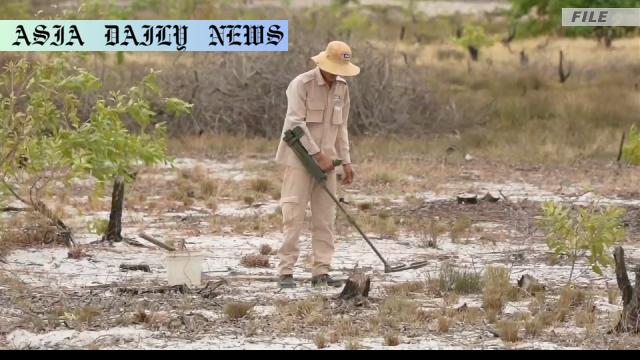Unexploded Ordnance: The suspension of US assistance has paused operations to remove hazardous bombs from Vietnam and Laos.
Unexploded Ordnance remains a critical issue in Vietnam and Laos due to remnants of the Vietnam War.
US foreign aid freeze caused a halt in dud-clearing operations funded by the State Department and USAID.
Organizations like MAG have paused efforts, impacting safety and environmental recovery.
Vietnam and Laos governments urge resuming aid for crucial operations.

The Legacy of War: Unexploded Ordnance in Vietnam and Laos
The Vietnam War, which ended nearly 50 years ago, left an enduring mark on the landscapes of Vietnam and Laos. Among the remnants of that era are the many thousands of unexploded ordnance (UXO) left scattered across farmlands, residential areas, and forests. These dormant bombs and munitions continue to pose a deadly threat to communities in these regions. Tragically, the explosive remnants have caused innumerable injuries and deaths over the past five decades, often targeting civilians unwittingly attempting to cultivate land or build homes.
How the US Aid Freeze Has Stalled Crucial Operations
In recent weeks, efforts to remove UXO have been abruptly suspended in the wake of President Donald Trump’s executive order temporarily halting nearly all US-sponsored foreign assistance programs for a 90-day review period. This decision has directly impacted organizations, like the British NGO Mines Advisory Group (MAG), that lead large-scale bomb-clearance projects. Many of these groups rely significantly on financial support from agencies such as the US State Department and USAID.
MAG has been compelled to pause much of its work aimed at both clearing these hazardous remnants of war and training local personnel in bomb disposal techniques. Without this access to funding, vital progress on improving safety and usability in at-risk areas has come to an abrupt halt. Similarly, Laotian government agencies have indicated that their UXO clearance operations have also been indefinitely paused due to funding disruption.
Affecting Environment, Livelihoods, and Safety
The consequences of halting this aid are far-reaching. Beyond posing a direct threat to human lives, unexploded ordnance significantly diminishes the usability of arable farmland, impacting agricultural productivity and livelihoods. Communities dependent on rice cultivation, among other crops, face severe economic repercussions as UXO renders these fields unsafe. Furthermore, environmental recovery in areas marked by past conflicts grinds to a halt when clearance operations stop.
A Vietnamese foreign ministry spokesperson recently voiced concerns about the freeze. These operations are vital to ensuring public safety and rehabilitating the environment of regions plagued by dormant munitions. The lack of funding threatens to negate years of progress made in safely restoring these lands for human use and habitation.
Responses and Calls for Action
The ongoing suspension has sparked calls for immediate action to lift the foreign aid freeze, especially regarding dud-clearance efforts. The Vietnamese government has emphasized the critical impact this aid has on ensuring safety for its citizens and fostering sustainable development. Stakeholders in affected regions argue that suspending such life-saving work undermines the goodwill and diplomatic objectives underpinning foreign aid initiatives.
Moreover, when UXO removal efforts are paused, communities must contend with the ever-present fear of inadvertent detonations, which pose a particular risk to children and agricultural workers. For a conflict that ended half a century ago, the delay in effective resolution underscores the lasting legacy of war and the importance of global cooperation in addressing such humanitarian outcomes.
Though these challenges persist, there is hope that international pressure and appeals from affected nations will prompt a quicker review of Trump’s executive order, allowing the necessary funds to flow once again into these vital programs. Time is of the essence, as the lives and livelihoods of countless individuals hang in the balance.



Commentary
The Weight of UXO’s Obstruction
The lingering legacy of unexploded ordnance (UXO) cannot be understated, a stark reminder of how war scars both people and land for generations. The suspension of US foreign aid, particularly for such a vital humanitarian endeavor, showcases the immense power foreign policies and executive decisions hold over lives far removed from the political epicenter. Every year, lives are silenced or forever impacted by these haunting remnants, and yet progress towards their removal finds itself so easily derailed.
The Balance Between Diplomacy and Necessity
While policy reviews and careful planning are necessary when dealing with international aid programs, the results of ceasing life-saving operations like these must be factored into those decisions. It’s disheartening to witness the lives of so many innocent civilians caught in the crosshairs of bureaucratic processes. Prioritizing safety and humanity over politics seems to be a requisite lesson we are compelled to relearn time and again.
Global Participation in a Lingering Challenge
The suspension also calls attention to the broader issue of collective global responsibility. While it’s commendable that external organizations like MAG have taken the initiative, the disruption highlights the need for sustained, multilateral cooperation to tackle long-standing and pervasive humanitarian crises. Beyond financial aid, international advocacy for demining missions and education for affected communities would only strengthen efforts to render these regions safer and more prosperous.
Ultimately, this halt in operations prompts questions that go beyond Vietnam and Laos—how can we ensure the lasting resolution of such legacies, and at what point does prioritizing diplomacy over urgency come at too high a cost? The world must recommit to addressing these unresolved remnants of war with the tenacity they require.